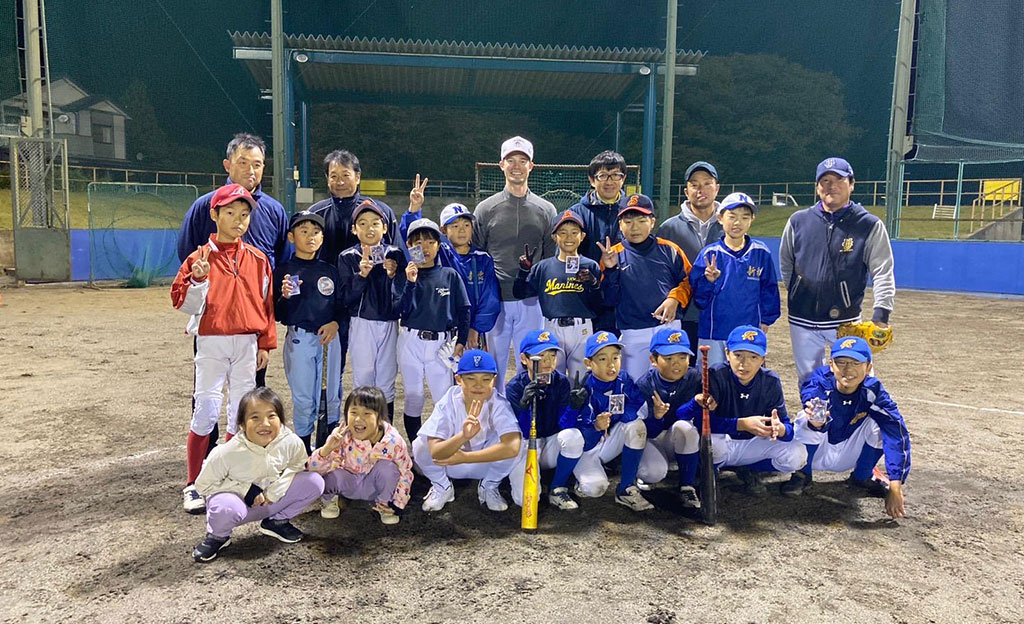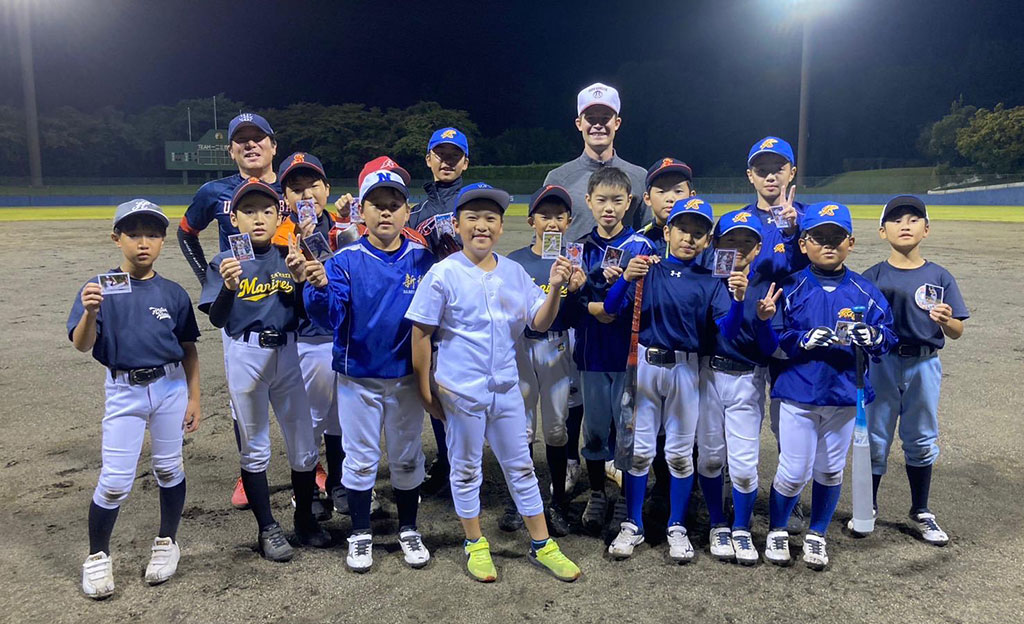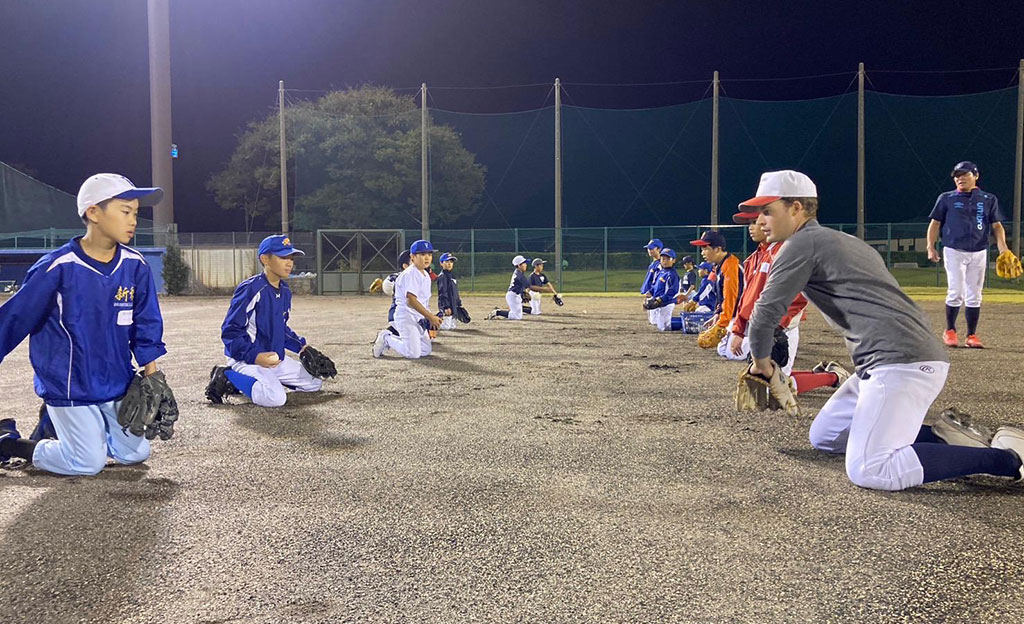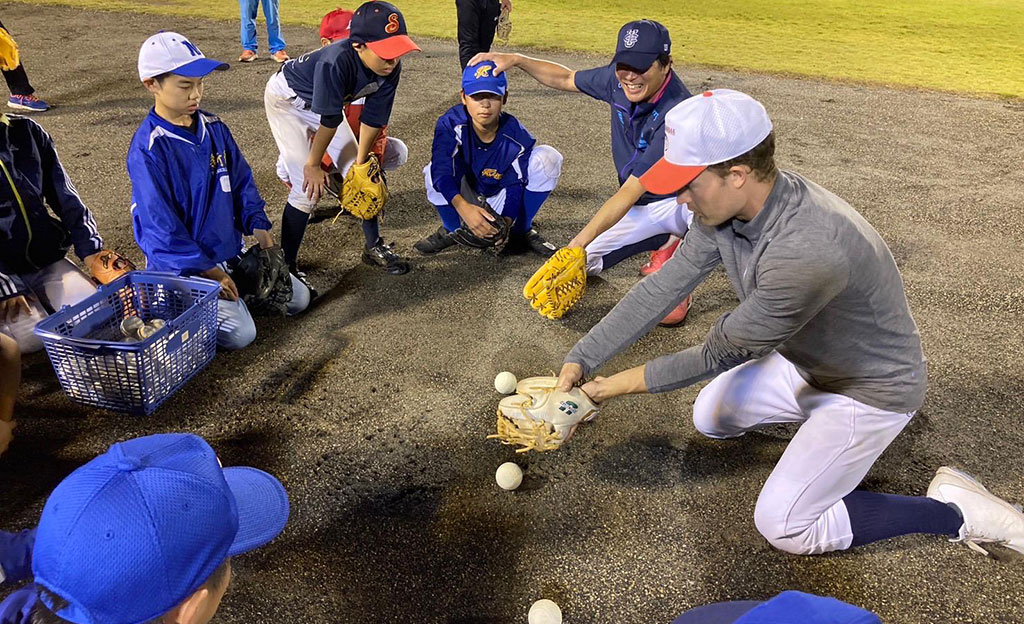By KC Smurthwaite
For Cameron MacIntosh, life has always revolved around baseball. It led him on a wild journey from the Pacific Northwest to Spartanburg, South Carolina, and ultimately to a small island off the coast of Japan. His story is one of seizing opportunities, embracing challenges, and letting passion for the game guide his path — wherever it takes him.

MacIntosh, or “C-Mac,” is originally from the state of Washington, but found his way to Spartanburg thanks to a well-timed recruitment by coach Kane Sweeney. After being noticed at a junior college showcase while Sweeney was at Morehead State, he quickly committed to USC Upstate when Sweeney accepted a job there.
Even without visiting the campus, MacIntosh knew it was the right fit. “It was one of the best decisions I’ve made,” he says, reflecting on the three years he spent helping to build the USC Upstate baseball program.
His time at Upstate was filled with unforgettable moments, but two memories stand out: the team’s thrilling victory over Clemson in 2021 and his record-breaking personal performance in 2022. The win against Clemson was a turning point. It pushed the team’s record to 12-0 and put the Upstate program on the national map.
“It felt like everybody knew who we were after that game,” MacIntosh recalls.
His personal highlight came in his final season when he set the school record for RBIs in a single game (eight) against Northern Kentucky. MacIntosh hit two home runs that game en route to an easy victory for the Spartans. What made it more meaningful was that his parents were in the stands to see it. Coach Sweeney joked, “Upstate baseball needed his good luck charms in the stands more often.”
Like many athletes, MacIntosh faced a tough transition after his college career ended. Unsure of what his next steps should be, he tried several different jobs, including a role as a project manager. Yet his heart always pulled him back to baseball.
“I would constantly be writing lineups, planning lessons, or just talking about baseball while working,” he says.
It didn’t take long for him to realize that coaching was his true calling.
A chance meeting with former Upstate assistant coach Pat McGuff in Nashville brought his aspirations into focus. That conversation sparked a decision that would change the trajectory of his life. MacIntosh decided he wanted to coach baseball – not just anywhere, but in Japan.
MacIntosh’s connection to Japan dates back to elementary school when he became best friends with a classmate who was from Japan. Over the years, he deeply admired the country and its culture.
So, after leaving his job, he took a bold step and booked a trip to Japan. The visit solidified his desire to coach there, and upon returning home, he threw himself into learning Japanese and finding a way to make his dream a reality.

In April 2023, he found the perfect opportunity through the JET Program, a well-known initiative that typically hires English teachers. However, there was a rare opening for a sports exchange advisor — a position that allowed Cameron to combine his love of coaching with his passion for Japanese culture.
He now coaches elementary and junior high students on Sado Island, an opportunity that has allowed him to both teach and learn, blending American and Japanese styles of baseball.
As MacIntosh reflects on his journey, he credits many coaches who shaped his approach, including former USC Upstate head coach Mike McGuire, current head coach Kane Sweeney, and Pat McGuff, who taught him valuable lessons about competition, connection, and attention to detail.
Now, as a coach himself, MacIntosh emphasizes building relationships with his athletes, understanding what motivates them, and adapting his style to each player’s needs.
The game of baseball may be played the same way on paper across the globe, but the subtle differences in how it’s taught and played reveal much about the distinct baseball cultures.
While the sport is often seen as quintessentially American, countries like Japan have unique approaches to player development, particularly at the youth level. Though MacIntosh emphasizes his experiences were limited, he noticed that everything from warmups to field surfaces shapes how kids learn the game.

“Warm up and catch play is highly organized and emphasized,” he says. “In Japan, preparation is key, and even the structured warmups have a purpose. When kids pick up a baseball, they’re taught precision and discipline — skills that carry into every aspect of the game.”
One of the most significant differences MacIntosh noticed during his time in Japan is the use of the “Kenko ball.” This rubber baseball, slightly lighter and much bouncier than its American counterpart, is a staple in many Japanese youth leagues, particularly in elementary and junior high schools.
“The fields are also different, particularly the infield,” MacIntosh explains. In Japan, most fields feature infields made entirely of dirt, a softer variety than what’s typically found in the U.S. “Combine a bouncier ball with an all-dirt field, and you see a very different style of infield play.”
Specifically, Japanese infielders learn to become quick and nimble, he says. “You see many kids more likely to use one hand to make plays because they have to learn this way,” MacIntosh observes.

In the U.S., by contrast, turf creates a more predictable surface and the ball’s movement is easier to track. As a result, youth players are taught to use two hands for routine plays, and they may not develop the same footwork as their Japanese counterparts.
So what’s next?
Looking ahead, MacIntosh remains open to wherever his passion for baseball might take him. He doesn’t have a defined career goal yet, but is committed to helping players improve and grow through the sport. Whether in Japan or back in the United States, he is driven by the desire to pass on his love for the game to future generations.
MacIntosh has simple advice for anyone considering USC Upstate, “You will get out what you put into your time in school. Upstate has various resources to help people from any background find success. So make the most of it.”
